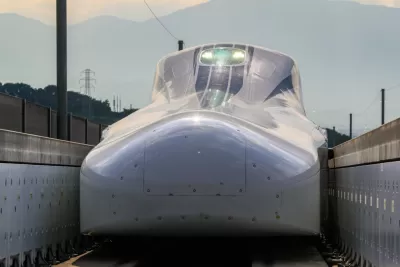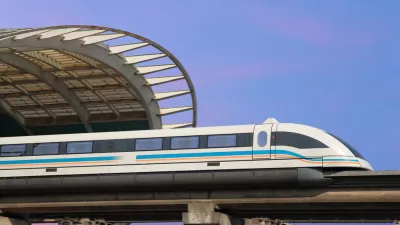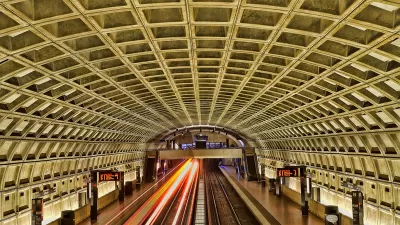Washington, D.C. officials are urging modifications to key components of a proposal to build a maglev system between D.C. and Baltimore, citing disruptions to neighborhoods and cost concerns.

In comments submitted to the Federal Railroad Administration (FRA), Washington, D.C. "is urging federal officials to modify key aspects of a proposed high-speed maglev train line before deciding whether to support a project that would take passengers between Washington and Baltimore in 15 minutes." As reported by Luz Lazo, the Northeast Maglev project aims to be in operation by 2030 and could be part of a future system "that eventually would carry passengers between D.C. and New York in an hour."
However, "[a]mong the District’s biggest objections is a 1,000-parking space garage proposed for Mount Vernon Square," which the comments call "an antiquated and inefficient way of managing transportation demand to the station." D.C. officials "echoed concerns raised by Baltimore and other project critics that the service would only be available to wealthier residents. The expected average fare would be $60 for a one-way trip, although it could vary between $27 and $80 per trip, project documents indicate."
Rather than building a new train system, critics argue, "the region should invest in improving existing rail operations, such as Amtrak and MARC commuter train service." The District's comments also called for "better pedestrian and bike connections, as well as links to the Convention Center, and to Metro stations at Gallery Place and Metro Center."
FULL STORY: D.C. wants changes to maglev train proposal, citing downtown disruptions and increased traffic

Alabama: Trump Terminates Settlements for Black Communities Harmed By Raw Sewage
Trump deemed the landmark civil rights agreement “illegal DEI and environmental justice policy.”

Study: Maui’s Plan to Convert Vacation Rentals to Long-Term Housing Could Cause Nearly $1 Billion Economic Loss
The plan would reduce visitor accommodation by 25% resulting in 1,900 jobs lost.

Why Should We Subsidize Public Transportation?
Many public transit agencies face financial stress due to rising costs, declining fare revenue, and declining subsidies. Transit advocates must provide a strong business case for increasing public transit funding.

Paris Bike Boom Leads to Steep Drop in Air Pollution
The French city’s air quality has improved dramatically in the past 20 years, coinciding with a growth in cycling.

Why Housing Costs More to Build in California Than in Texas
Hard costs like labor and materials combined with ‘soft’ costs such as permitting make building in the San Francisco Bay Area almost three times as costly as in Texas cities.

San Diego County Sees a Rise in Urban Coyotes
San Diego County experiences a rise in urban coyotes, as sightings become prevalent throughout its urban neighbourhoods and surrounding areas.
Urban Design for Planners 1: Software Tools
This six-course series explores essential urban design concepts using open source software and equips planners with the tools they need to participate fully in the urban design process.
Planning for Universal Design
Learn the tools for implementing Universal Design in planning regulations.
Smith Gee Studio
Alamo Area Metropolitan Planning Organization
City of Santa Clarita
Institute for Housing and Urban Development Studies (IHS)
City of Grandview
Harvard GSD Executive Education
Toledo-Lucas County Plan Commissions
Salt Lake City
NYU Wagner Graduate School of Public Service




























